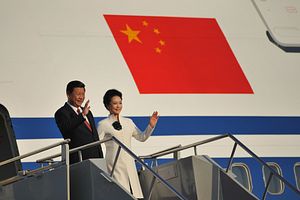Those in democracies know that, for all the many excellent things that democracy brings in terms of accountability, enforced transparency, and offering at least some ways of reigning in rampant elites, there is also one big downside — the phenomenon of the more wily politicians trying to become our friends. The British discourse analyst Norman Fairclough referred to this a decade ago in his book New Labour, New Language. He wrote that one of then-UK Prime Minister Tony Blair’s most notable achievements was to deploy a language and a persona in which he seemed just like “one of us,” a regular guy who just happened to be the most powerful man in the country. The same transformation occurred with George W. Bush. Despite coming from one of the most solidly elite families in the United States, Bush achieved a personality makeover that had most Americans seeing him as a straightforward guy, someone you could share a beer with — at least, when he was not busy prosecuting wars.
Xi Jinping seems willing to assume this sort of “man of the people” role in China, where the novelty is more striking because power differences are greater. The question now is whether Chinese people want the key member of the Politburo speaking to them like their new best friend. Xi lining up to get a modest meal of dumplings and pig liver last month was a bold move. Even seeing a Politburo member in the world (so familiar in everyday Chinese life) of rickety, laminate-topped dining tables and noisy, cheap eateries is modestly revolutionary. The most Hu Jintao ever allowed were wooden pictures of him uneasily wrapping New Year dumplings for grateful, attentive farmers.
Xi seems to have high hopes that this populist image will yield political returns. His letter in response to Chinese students in Germany this week is different from the sort of moralizing, haughty edict we have grown accustomed to from senior Chinese leaders. Instead, the letter has some elements of modesty about it. The rumors of Party Secretary Xi taking a taxi ride last year, which were denied at the time, now start to seem more plausible. Xi is willing to at least break free from the tight cordon of protection that surrounds him, physically and verbally.
But there is a snag. National leaders in China, as surveys over the last few years have shown, have on the whole enjoyed higher ratings than local ones, who are almost universally regarded with loathing and contempt. A petitioner who managed to get through to Wen Jiabao a few years ago was symptomatic of the many who believe, just like those that lived under Mao, that if you could only convey your complaint to the top leaders in Beijing, all your problems could be solved. But this sense of closeness to a normally remote figure like Xi is also risky. At some point, citizens may well start to collectively express very specific and pointed desires for Xi to deliver on things like cleaning up the awful pollution in China’s major cities, rectifying some of the vast distortions in the local and national economy, or even doing something more radical about the daily provocations, as they are seen, of regional neighbors. This sort of public demand directed at the straight-talking, down-to-earth Mr. Xi might start to create a new sense of accountability and, if nothing much gets done, sharpen the public’s dissatisfaction. Xi has done the riskiest thing for any politician – he has inspired hope.
Xi has probably made a calculation that mobilizing your most precious asset – the people – is a good thing, and that this new kind of relationship carries more positives than negatives. At the moment, on the whole, it seems the novelty of a top leader being populist in this way is creating public dividends. From what we can see and hear Xi seems liked, and if a politician is liked, people are willing to do things for them as a general rule. But the nagging question about what happens when a real crisis comes still lingers. Is Xi really up to the job underneath his excellent PR? Mr. Xi may well look at the political fates of great communicators like Mr. Blair, whose nice words and ready smile are now replaced by a haggard, haunted look over the debacle of Iraq. Words are important, as Mr. Xi well knows. But in the end, acts define someone in power, and in that category, so far, there has been very little to go on.

































